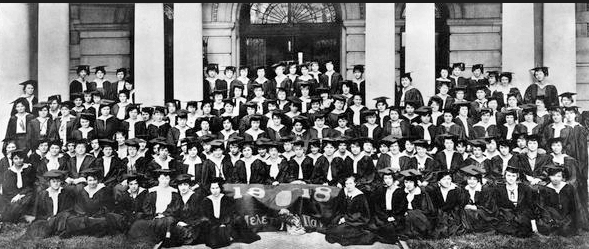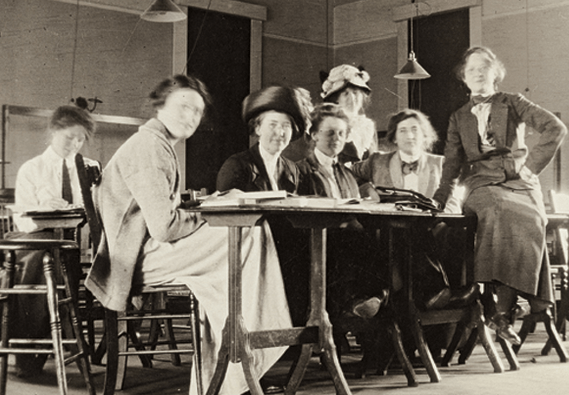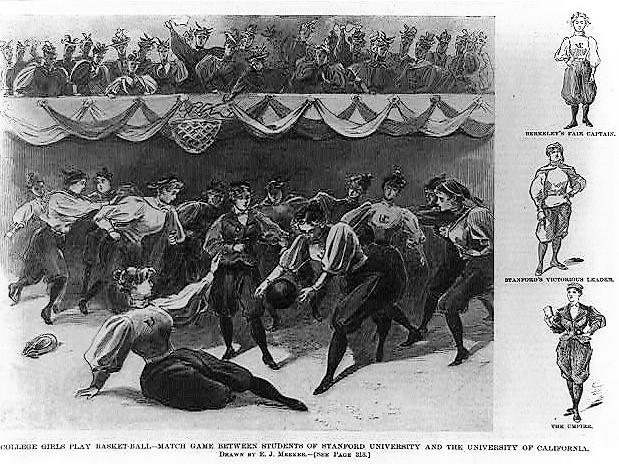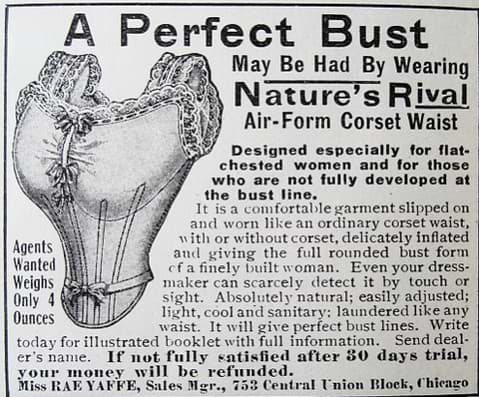I’m angry, people!
Over the past year, I’ve traded the horrible news of today for the even more horrible news of 1918, when the world was disease-ravaged and at war, suffragists were greeted with condescending amusement, there was a “Darkies” section in the leading humor magazine, and progressives debated about who should be allowed to breed.
I hate what was happening then, and I hate what’s happening now. But, unlike a lot of my friends, I haven’t fallen into a permanent state of anger and/or depression. It’s a question of temperament, I guess. At heart, I’m a sunny soul.
But then I read an article in the Educational Review called “Sex in Mind and Education,” and I was livid.
I was expecting an entertaining romp through the world of social hygiene, as sex education was known back then.* Instead, I got an article—two, actually, spread over the May and September 1918 issues—about why women are unfit for higher education.
An issue for another day, I thought, since I’ve been trying to focus more on World War I with the centenary of the armistice approaching. But then I remembered the suffragists being asked to put aside their demands because there was a war on. And, skipping back to the present, this West Virginia constitutional referendum I just voted on, which, whatever your views on abortion, is legally meaningless as long as Roe v. Wade is in place and also maybe not the most urgent issue in a state that’s awash in opioids. (UPDATE 11/7/2018: The amendment was approved, 52%-48%.)
German imperial ambition is, I think we can say with confidence, safely in check. The war on women, not so much. So I retrieved “Sex in Mind and Education” from the “later” pile.
The article, written by British psychiatrist Henry Maudsley, turns out to date back to an 1874 issue of the Fortnightly Review. The Educational Review justifies its republication by noting that it was reprinted and given wide circulation in Mr. C.W. Bardeen’s Series of School Room Classics. Which happened in 1884, so I’m not sure why it was considered timely in 1918. Maybe because Maudsley had just died? Maybe to keep women in their place with suffrage on the rise? Maybe because the journal’s editor was Columbia University’s horrible, reactionary president Nicholas Butler? Maybe all of these things? Who knows?
Maudsley’s bottom line: women shouldn’t go to college with men, because menstruation.
Of course, there’s more to his argument than that. He has a LOT of reasons why women shouldn’t go to college with men. But, for someone so esteemed that Britain’s largest mental health training institution bears his name to this day**, he’s not exactly rigorous about evidence. He’s all “it is quite evident that” this and “when we thus look the matter honestly in the face” that.
So I decided to subject his arguments to evidence-based testing by pulling out his assertions so that we college-educated women can compare them to our own experience. And turned them into a quiz, because what woman doesn’t love a quiz? (No need to feel left out, men—we need a control group, so you can take it too.)
Get out your pencils!
- If you have a delicate constitution, with little vitality to spare, did you break out into disease when you reached puberty?
YES NO N/A
- In your experience at university, could the difference between between male and female students accurately be described by the expression “for valor he” is formed and “for beauty she and sweet attractive grace”?***
YES NO N/A
- Have childbearing and raising been the most important offices of the best period of your life?
YES NO
- Did your laborious days of intellectual exercise and production cause injury to your functions as the conceiver, mother, and nurse of children?
YES NO
- Has this intellectual exercise resulted in your children being puny, enfeebled, and sickly?
YES NO N/A
- If your household has a male primary caregiver, is he almost as much out of place in caring for the babies as he would be in attempting to suckle them?
YES NO N/A
- If your household has a male primary caregiver, has he abandoned the task in despair or disgust, and concluded it not to be worth while that mankind should continue on earth?
YES NO N/A
- If you attended a coeducational college, was it at a cost to your strength and health which has entailed life-long suffering, and even incapacitated you for the adequate performance of the natural functions of your sex?
YES NO N/A
- If you attended a coeducational college, do you feel that the stimulus of study had a more harmful effect on you than on your male classmates, not only because of your greater constitutional susceptibility, but also because women do not have the compensating balance of competition on the playing field?
YES NO N/A
- In your experience, has the prediction been borne out that, due an increase in women’s education, the wives who are to be the mothers in our republic [the United States—Maudsley’s quoting a Harvard professor now] must be drawn from transatlantic homes?
YES NO
- Has study during the periodical tides of your organization [i.e. your period] led to pallor, lassitude, debility, sleeplessness, headache, neuralgia, and then to worse ills?
YES NO
- As a result of your studies, have you become the victim of aches and pains, unable to go on with your work, and compelled to seek medical advice?
YES NO
- If so, and if you were restored to health by rest from work, a holiday at the seaside, and suitable treatment, did you leave college a good scholar but a delicate and ailing woman, whose future life is one of more or less suffering? Did you fail to regain the vital energy which was recklessly sacrificed in the acquirement of learning?
YES NO N/A
- If so, and you subsequently married, were you unfit for the best discharge of maternal functions, and apt to suffer from a variety of troublesome and serious disorders in connection with them?
YES NO N/A
- Has the neglect of physical exercise, and the continuous application to study, left you lacking the instinct, desire, or capacity to nurse your offspring, forcing you to resort to a wet-nurse or feeding by hand?
YES NO N/A
- If you have not nursed, has this caused the organs which minister to this function to waste and finally to become by disuse as rudimentary as they are in the male sex, forcing you to invoke the dressmaker’s aid in order to gain the appearance of them?
YES NO N/A
- During the best years of your life, are/were you, for one-quarter of each month, more or less sick and unfit for hard work?
YES NO
- Have you turned into a monstrosity—something which having ceased to be a woman is not yet a man?
YES NO
Okay. Pencils down.
In the spirit of fairness, Dr. Maudsley quotes John Stuart Mill’s argument in The Subjection of Women, to wit:
- What we call the nature of women is essentially an artificial thing.
- It is the result of forced repression in some directions, unnatural stimulation in others.
- Women’s character has been disguised by their subjugation by men.
- If given equal opportunities, they would perform as well as men.
He says that
if these allegations contain no exaggeration, if they be strictly true, then is this article an entire mistake.
Is it??? Let’s score the quiz and see! Disregard the N/A’s, count up the yeses, and divide them by the total number of questions you answered.
It would be terrible for humankind if even a significant minority of Maudsley’s concerns turned out to be valid. So let’s give him the benefit of the doubt and say that if most women score over 25% we’d better rethink this this whole going to college with men business.
I threw out a bunch of questions because I don’t have kids and calculated my score: 9%. My one “Yes” answer was to #4, about my laborious days of intellectual exercise causing injury to my functions as the conceiver, mother, and nurse of children. Most college-education women have children, but the percentage is lower than among women without college, so I’ll give this one to Maudsley.
Granted, one is a small sample size if we’re trying to be scientifically rigorous, but it’s one bigger than Maudsley’s. And I’m guessing that my score is typical. Maybe some of you moms consider childbearing and raising the most important offices of the best period of your lives. But maybe some of you dads do too, so here’s where the control group comes in.
So, unless I’m gravely mistaken, Maudsley is hoist with his own petard.
But he’s not giving up so easily. Even if John Stuart Mill turns out to be right, he says,
there is a right in might—the right of the strong to be strong. Men have the right to make the most of their powers, to develop them to the utmost, and to strive for, and if possible gain and hold, the position in which they shall have the freest play.
If women were treated equally, and used their political power to pass laws that men didn’t like, he asks,
can it be supposed that, as the world goes, there would not soon be a revolution in the state by men, which would end in taking all power from women and reducing them to a stern subjection? Legislation would not be of much value unless there were power behind to make it respected.
You see what’s happening here, people? Maudsley’s admitting that, if women get too equal, the men are going to have a revolution! Throw out all the laws! Rely on brute force!
We have to do something, women!****
Starting with this:
*And which I can’t believe I’ve made it to November without writing about. On the list!
**Oh and he also gave them a lot of money.
***Hey Maudsley, you got the quote wrong! Here’s what Milton really said:
Not equal, as their sex not equal seemed;
For contemplation he and valor formed,
For SOFTNESS she, and sweet attractive grace.
****I realize that some men might be reading this, but if they managed to stomach all the menstruation talk they’re probably allies.











You might read — it must be online somewhere — the response to Maudsley by Elizabeth Garrett Anderson (the first woman doctor in Britain) in The Fortnightly Review. She was rather surprised to find herself discussing menstruation in the pages of a non-medical journal.
She points out that poor women also menstruate and just have to continue on with their daily work, “without intermission or ill effects”.
She also talks about the effects on women of horse riding, novel-reading, early marriage and stove-heated rooms.
I too am curious how this article came to be reprinted at this late a date, even in a journal edited by Nicholas Murray Butler (favorite trivia fact: in 1913 he was retroactively named Taft’s running mate in 1912). Columbia, by the way, being the last of the Ivies to go co-ed, the same year you graduated college.
LikeLike
I’m reading the Elizabeth Garrett Anderson response now, thanks! I love the way she starts out all prim and proper and then goes on the attack: “Fine, you want to talk about menstruation? I’LL tell you about menstruation!” And dissects Maudsley’s arguments point by point with the intellectual rigor that his article lacks.
That is a great piece of Nicholas Butler trivia–the man certainly did get around. In April, I wrote about rumors that he ghost-wrote the sneering 10-10-1917 NYT editorial about Charles Beard’s resignation from Columbia. Would love to hear your take on that.
I have a vivid memory of hearing as a Harvard undergrad that Columbia was going coed–with a little wistfulness, because I had dreamed of going to college in New York.
LikeLike